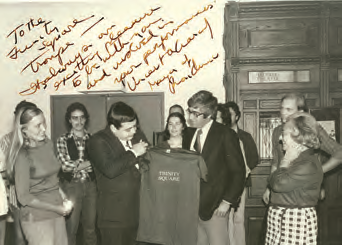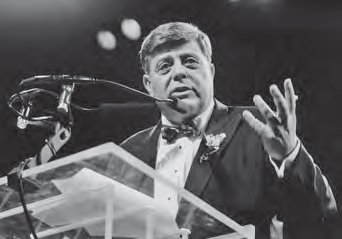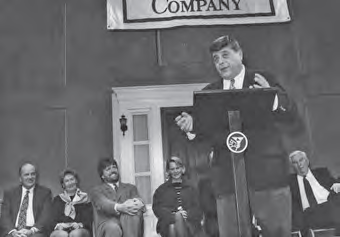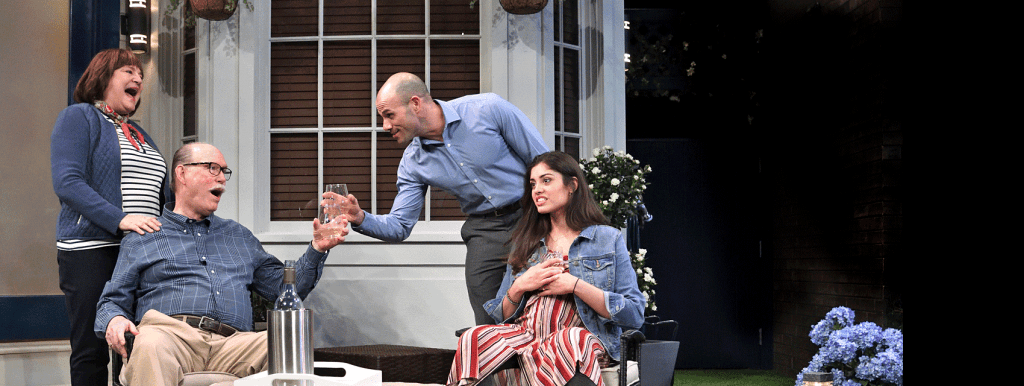8/29/19
By Emily Atkinson
In the long, dramatic history of Trinity Repertory Company, Vincent A. Cianci, Jr., played a critical role. Ask anyone about Cianci, and you’ll hear more stories than you can count. Ask about Buddy and Trinity Rep, and you’ll hear one statement, again and again: Trinity Rep wouldn’t be here without Buddy.

When Trinity Rep faced fatal financial deficits, million-dollar bailouts from the City demonstrated Cianci’s esteem. A vibrant downtown was essential to the Mayor’s success, and over the years, his stump speech and talking points included Trinity Rep, Providence Performing Arts Center, AS220, Waterplace Park, the Providence Bruins, Providence Place Mall, Kennedy Plaza’s skating rink, Providence Film Commission, historic preservation, and more.
When Cianci became Mayor in 1975, there was no downtown “arts scene.” A beacon on Washington Street was Trinity Rep, eleven years old, having converted the crumbling 1917 Emery’s Majestic Theater (most recently a failed movie house). That season included iconic shows Peer Gynt, Tom Jones, and Seven Keys to Baldpate, and Cathedral of Ice opened the next fall. Many of Artistic Director Adrian Hall’s choices thrilled audiences, but a series of managing directors – 12 in 10 years – often struggled to make payroll. Four Providence banks forgave the $400,000 mortgage on the building; it was clear they wouldn’t get paid. Mayer Levitt, trustee emeritus, recalls Cianci’s support at the time: “I knew Buddy pretty well, because he was such an accessible person. In the 1970s, fundraising was a real grassroots struggle. Once or twice we were in serious trouble, and Buddy came through. I remember meeting with him. I have no idea where he got the money. No one does.”
Trinity’s most precarious chapter came after Hall departed in 1989, and his successor, Anne Bogart, proved a bad match for what remained of the theater’s audience. When Bogart resigned after a year, company actor Richard Jenkins agreed to serve for a year (which stretched into four), but the coffers were empty. “The place was reeling,” wrote Bill Gale, then theater writer and critic for the Providence Journal, in 1992, the first year of Cianci’s post-felony term. “It was days away from closing, according to some accounts, when Jenkins came on board… The audience was returning, but the best box office in the world isn’t going to make up a $1.2 million debt.” Richard Jenkins agrees: “He saved the theater when I was Artistic Director. The theater had lost subscribers when I came in, and we were in dire straits, so we went to City Hall to meet with Buddy.” Company actor Brian McEleney remembers Managing Director Dennis Conway, “uncharacteristically suited up in his Sunday best, sweating, setting out on foot to City Hall to plead our case.” Jenkins recalls, “When we explained our deficit, Buddy said, ‘I will not have this city without Trinity Rep.’ And he made good on his promise.” McEleney adds, “Were it not for Buddy, I shudder to think where we’d all be today.”
Bill Gale wrote, “To his credit, the Mayor decided that in an arts sense, Providence without Trinity was Podunk. He came up with an innovative, possibly even unique deal. Providence would borrow the $1.2 million from the federal Housing and Urban Development department and give it to the theater. Trinity would pay it off in 20 years.” The scheme failed to win approval in Washington. Plan B: Cookson America had a million- dollar HUD loan to build its headquarters in the old Union Station. The loan was due in 1999, but Cianci convinced Cookson chairman Richard Oster to pay it seven years early. This too was HUD money, but Washington okayed it. Gale covered the Mayor’s press conference: “It was, truly, a bravura performance. The Mayor as ringmaster. But beneath the hoopla, there was substance. Cianci has come up with two innovative ways to keep Trinity afloat. The second one apparently is going to work. Let us hope there is no need for a third act. Let’s keep the drama on the proper end of Washington Street.”
Act III arrived at the end of 1995, with new lead players: Oskar Eustis, artistic director; Patricia Egan, managing director; and Geoffrey B. Davis, board chair. Deficits had wiped out the million-dollar HUD loan. Would the City like to buy Trinity Rep’s building? While that proposition stalled, the team met with the Mayor, seeking a solution that would let Trinity settle its debts and plan for a stable future. The current season was in the black.

Patricia Egan recalls, “We worked closely with the City’s Planning and Development staff: John Palmieri, the director, and Joseph Abbate, the deputy director. They absolutely worked with us because Buddy wanted to help Trinity succeed; he needed an active and vibrant theater running ten months a year if he was going to be successful in the rest of his downtown renaissance work. They couldn’t come up with direct, immediate funding, but instead the City assigned a note receivable to Trinity, which would pay the theater $2.35 million on maturity, in 2015. It gave us an asset we could borrow against, and the promise of future cash.”
In May 1996, the Providence Journal reported the bailout plan, which would stabilize the company’s finances, rebuild the endowment and cash reserve, and pave the way for a capital campaign: “The Providence Economic Development Corporation has borrowed $570,00 from Fleet Bank, then loaned the money to Trinity. The City has given Trinity the rights to $1.2 million owed the City by Fleet Bank. (Fleet owes the money as part of the federal Urban Development Action Grant program (UDAG), which gave the bank $11 million in 1981 to build its tower…) Using the debt as collateral, the theater has gotten a $345,000 line of credit from Citizens and Hospital Trust Banks. In 2015, Trinity will collect the entire $1.2 million – plus $1.145 million in interest, a total of $2.345 million…Cianci said he ‘went to bat’ for Trinity because arts organizations ‘are the things that make cities. They are what makes a first-class city…We are behind all the arts. Can you imagine if Trinity closed?”… David Igliozzi, City Council majority leader, was unaware of the action and said he would ask the city law department about whether the council should have been consulted. Mayor Cianci said the council did not have to be consulted.”
John Harpootian served on Trinity Rep’s board of trustees at that time. “I’ll never forget the day I signed the check that emptied our endowment fund,” he says. “I knew it was a make-it-or-break-it event. Once that money was gone, only the UDAG money was going to keep Trinity afloat. Sure enough, within a few months the endowment money was all gone – but the UDAG money came in, saving Trinity for another day, thanks in most part to His Honor Vincent A. Cianci, Jr. The Mayor was relentless in wanting to ensure that Trinity didn’t close. Sally Dowling and Geoff Davis both did extraordinary jobs as chairs of the board at those difficult times. Supporting them both, I was someone the Mayor could speak to politically – I’d been part of his campaigns from the beginning. It worked out, but it wasn’t easy. There were times when these creative financial arrangements almost fell apart, but they didn’t — and most of the credit belongs to the Mayor. Without the force of his personality and the power of the office of Mayor of Providence, Trinity wouldn’t have had the chance to become the Trinity we know today: it would have imploded from its own debt.”
At the end of that week, Gale’s regular arts column declared “Let’s make this the last time the City bails out Trinity Rep… As Buddy Cianci says, ‘Can you imagine this city without Trinity?’ Cianci, by the way, has been great for the arts in this town. Say what you want about one of the country’s most, ahh, colorful, officials, the man knows that the arts are important to the quality of life. And he puts his money (or at least the City’s) where his mouth is.”

Indeed, Trinity Rep’s finances stabilized, allowing the leadership, including new board chair Buff Chace, to lay the groundwork for the capital campaign that would secure the future. The City of Providence supported that campaign, but the bailouts ended. Cianci remained an enthusiastic booster. Board member Jon Duffy says, “As a kid, Buddy was a regular on a local talent show on WEAN…he used to talk about that. His life was theater, so he loved being in the theater.” Company actor Stephen Berenson recalls a curtain call: “Buddy jumped up out of his aisle seat and shook my hand. Full of excitement, he said: ‘When’s Barbara Meek coming out?!’ I said, ‘Mayor, if you let go of my hand, she’ll be here in a moment!’”
Edgar Dobie, managing director 2001-2006, reflects, “I remember Buddy as the showman who travelled with his own sound system and cases of his signature marinara sauce… a couple of cases in the trunk and his trooper driver to set up the speakers and unload the sauce. I’ll remember to my dying day the look on Leslie Uggams’ face in our lobby, accepting a jar from a hugely admiring Mayor. He loved artists and his own celebrity. He kept both Trinity and PPAC front-of-mind – that was one of the good things in his complicated relationship with us all.”
Company member Phyllis Kay recalls, “Buddy had a book signing at Foxwoods. I took Mom, who was a big fan. He was positively courtly to her, and of course they had that Italian thing going. I made sure to thank him for keeping Trinity open, way back when — to which he replied, ‘Yes, I did!’ Somehow, it didn’t come across as arrogant. He always made you feel as if he was just delighted to visit with you. And of course, if you appreciated him and let him know it — even better.”
Supporting the conversion of downtown’s former Ocean State Theater to the Providence Performing Arts Center and securing funds for its expansion to host tours of big Broadway shows earned recognition from the League of American Theaters. In 2000, Buddy was voted by Americans for the Arts and the United States Conference of Mayors as the winner of the “Government Leadership in the Arts Award,” as the local arts award recipient. Cianci also saw that historic preservation put Providence on the map, at a time when some cities were tearing down historic buildings in areas similar to Benefit Street. In 2006, the Providence Preservation Society inducted Buddy into its Hall of Fame, recognizing his support. The timing of the honor, during Cianci’s incarceration, touched off a firestorm of controversy.

Arts leaders stepped up to help Cianci after the Operation Plunder Dome indictments. A story on the Providence Journal’s front page may have lost the public’s attention in the events of that day, September 11, 2001: “Cianci seeks money for campaign, legal defense: Mayor Vincent A. Cianci Jr., facing the political and legal battles of his life, has enlisted aid from…arts leaders to help him raise money…Cianci’s embattled campaign fund, which has had its bank accounts frozen because of the federal indictment…hopes to receive a boost on Thursday from a $125- per-person political fundraiser at the Providence Biltmore. The hosts…are Oskar Eustis, artistic director of the Trinity Repertory Company; J. Lynn Singleton, president of the Providence Performing Arts Center; and Bert Crenca, artistic director of AS220…. Eustis joked to a reporter that the only qualm he has about co-hosting a fundraiser for a mayor under indictment is ‘getting calls from guys like you… The mayor has been a fantastic supporter of the arts community, and I want to be supportive of that…I’ll be there to lend my name and good cheer.’”
After Cianci’s conviction forced his resignation, Channing Gray offered his successor some advice in a July 2002 Providence Journal column: “Memo to Cianci’s successor – Nurture the arts. Say what you will about Buddy Cianci, but he’s understood Providence would have never risen from the ashes without the arts. And he’s been a master when it comes to the creative use of federal money to keep Trinity afloat over the years, to help PPAC and others.”
Jon Duffy sees Cianci’s public relations acumen as a bonus. “It helped Trinity when Buddy used the theater as one of his talking points,” he says. “Buddy would talk to anyone and any publication, and Trinity was at the center of his renaissance story. He firmly believed that the arts were the heartbeat of a city.”
Mayer Levitt considers Cianci’s legacy: “If we try to be objective, we see he was pro-city and pro-arts. It made him look good, yes, but it helped Trinity Rep and others survive. It’s not fair to excoriate this man. If it hadn’t been for Buddy, Trinity Rep wouldn’t be here.”
Note: Trinity Rep is no longer on the brink and was recently named a Four Star Charity by Charity Navigator for its financial performance, accountability, and transparency.

